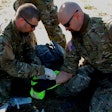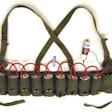The Muskingum County (Ohio) Sheriff's Office began receiving calls of wild exotic animals running loose outside Zanesville at about 5:30 p.m. on Oct. 18. Four deputies, armed with rifles, responded in a pickup truck. When they arrived, they faced what was one of the most unusual, unprecedented, dangerous and terrifying situations in modern U.S. law enforcement history.
Muskingum Sheriff's deputies faced 56 wild, exotic animals running loose around a 73-acre private exotic animal farm. The animals were apparently released from their cages by the 62-year-old owner, who was discovered dead of an apparent self-inflicted gunshot wound.
We're not talking about ordinary exotic animals. There were 50 full-size adult lions, tigers, leopards, cheetahs, mountain lions, wolves, black bears, grizzly bears, baboons and monkeys. And they were running freely both inside and outside of the farm's short livestock fence.
Deputies face the challenges of protecting nearby residences, dealing with traffic on the I-70 freeway, and facing fast-approaching nightfall. As a result, deputies needed to act decisively and quickly to prevent the loss of human lives. Mutual-aid calls went out. Licking County SO activated their SWAT team with night-vision devices. Ohio Highway Patrol responded. Personnel from the Columbus Zoo and The Wilds (an animal preserve) arrived. Municipal police and fire answered the call. A thermal-image equipped helicopter was also requested, but was unable to fly due to stormy weather.
It fell on the initial deputies to shoot and kill the escaped wild animals under threatening conditions. As 25-year-old MCSO deputy, Jonathan Merry, did, when a black bear charged at him. Deputy Merry was forced to shoot and kill the bear with his service pistol from seven feet away.
Other deputies and officers, including SWAT, found themselves in similar situations, and before it was over, LEOs were forced to shoot and kill 50 of the escaped wild animals, many at close range. The remaining six animals were captured and transferred to the Columbus Zoo.
Early in the incident, a veterinarian attempted to tranquilize a tiger at 10-15 yards away. As one witness said, the tiger "went crazy" and had to be shot. Animal experts readily admit tranquilizer usage is complicated and unpredictable, even under ideal conditions.
Several deputies were upset at having to shoot the animals; however, they had no other viable choice. Famed former Columbus Zoo director, Jack Hanna, immediately came to the deputies' defense: "This is a terrible situation. The loss of any animal is tragic ... the loss of a human life would be even more tragic. It's like Noah's ark wrecked."
Credit must be given to all the LEOs involved for their quick, decisive actions in the face of extreme danger; they undoubtedly prevented the loss of any number of human lives. Muskingum County Sheriff Matt Lutz's decisive, unwavering leadership deserves special credit, because he prevented this crisis from becoming a human tragedy of unprecedented proportion.
The shootings sparked outcries and outrage from a number of sectors. In response, Sheriff Lutz and Jack Hanna stood in unison as they eloquently explained their rationale that there was no other viable option than to shoot the animals to protect human lives. The leadership of Sheriff Lutz and Jack Hanna extended to how they handled the widespread media attention. In the words of one Zanesville letter-to-the-editor writer, "He [Lutz] handled the media. They did not handle him."
To which I would add that there is no playbook for this unprecedented incident. The only incident remotely similar to this was the tiger that climbed out of its San Francisco Zoo enclosure in 2007, killing and wounding two people, before being shot and killed by responding SFPD officers.
When thinking about the Muskingum County tragedy, the natural question that needs to be asked is "could this happen again?" Most zoos have enclosures, fences, contingencies, and trained armed personnel to deal with this possibility.
What about the many private animal farms scattered across America? There are many legitimate farms, who take proper precautions, including site hardening and training employees for contingencies. But what about the others that operate without oversight, regulations, or precautions? One neighbor of the animal farm is quoted as saying, "The farm was just a bomb ready to go off at any time, and it did."
While there's no way of knowing if something like this will happen again, law enforcement must be ready to handle the "unfathomable." Because once in a great while, the unfathomable actually happens.




















